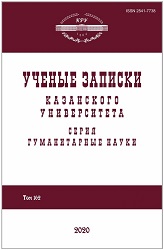Лексико-грамматические особенности прямой и косвенной речи в турецких новостных материалах
Lexical and Grammatical Aspects of Direct and Indirect Speech in Turkish News Language
Author(s): Olga Andreevna AlekseevaSubject(s): Media studies, Syntax, Lexis, Semantics, Pragmatics, Turkic languages
Published by: Казанский (Приволжский) федеральный университет
Keywords: lexical and grammatical aspects; Turkish language; news language; news material; direct speech; indirect speech; verbs of saying; Turkish syntax;
Summary/Abstract: The lexical and grammatical aspects of direct and indirect speech in the Turkish news language were considered based on the materials from trustworthy Turkish online media, from which more than a hundred sentences containing direct and/or indirect speech were selected and analyzed. The following ways of introducing indirect speech were identified: predicate of indirect speech takes the form of verb noun -mA; predicate of indirect speech takes the forms -DIğI/-AcAğI; indirect speech is introduced as an extended participial phrase with semi-predicative meaning expressed by the participle of the present and past tense -An formed from verb of saying. Direct speech is formed: with the word diye; with the pronouns şu and şöyle; with a noun which forms a one-affix izafet (indefinite nominal compound) with direct speech and a verb. Combinations of direct and indirect speech in one sentence were as follows: indirect speech is formed with extended participial phrase expressing semi-predicative meaning, direct speech is formed with the word diye or nominal compound; indirect speech is in form of extended adverbial participial phrase with participle -ArAk, direct speech is formed with the word diye or nominal compound; indirect speech is in form of extended participial phrase expressing semi-predicative meaning, direct speech is formed with the pronouns şu and şöyle; indirect speech is in form of extended adverbial participial phrase with participle -ArAk, direct speech is formed with the pronouns şu and şöyle. The most frequent speech verbs were identified and classified into different lexical and semantic groups. They were analyzed in the context of co-occurrence with the verb noun -mA and the forms -DIğI/-AcAğI.
Journal: Ученые записки Казанского университета. Серия Гуманитарные науки
- Issue Year: 162/2020
- Issue No: 5
- Page Range: 9-25
- Page Count: 17
- Language: Russian

